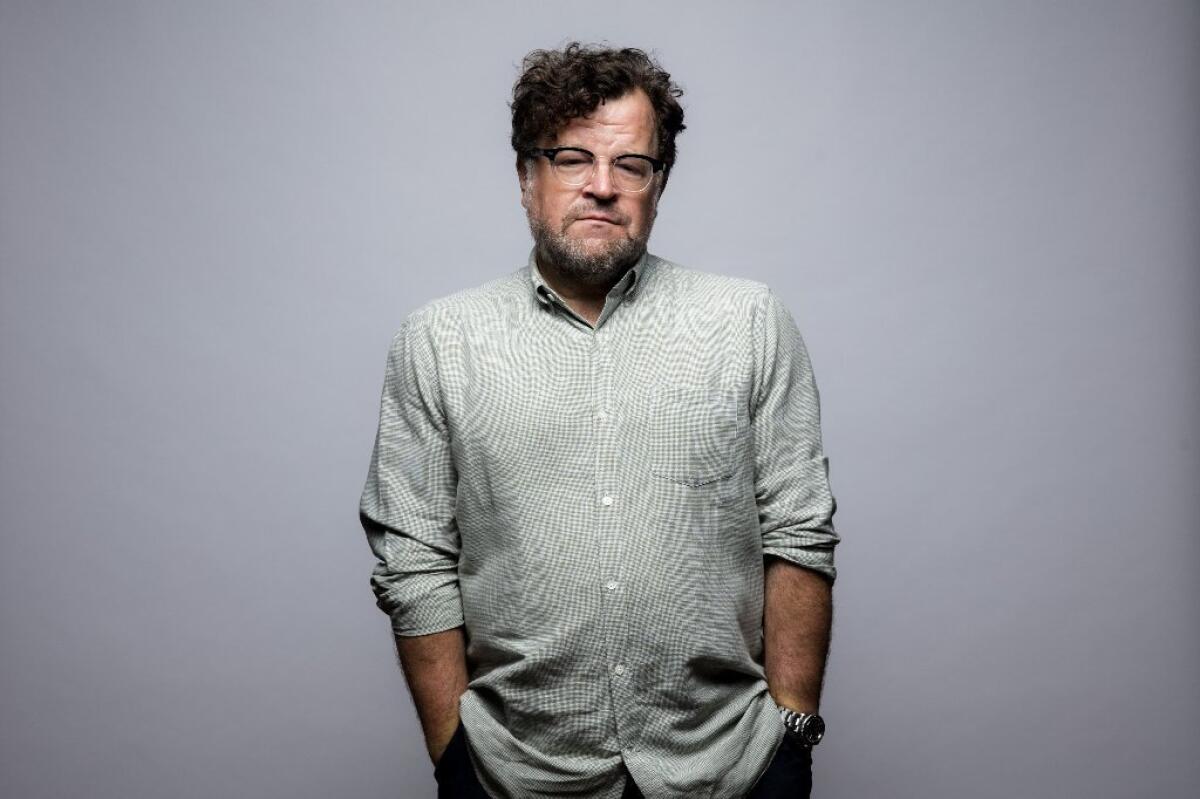‘Manchester By the Sea’s’ director chronicles what the film world has forsaken: humanism

Reporting from NEW YORK — “I should tell the people in L.A. that I’m here,” director Kenneth Lonergan said to a reporter in front of a downtown Manhattan restaurant on a recent Sunday morning. “Because I’m usually late and I think they’d feel better to hear it.”
The comment, about his publicity team, was uttered with what might be called Lonergrithm — a legit sincerity laced with amused ennui, as if to say, “I want to do right by the people trying to help but I can’t help feeling this whole machine is a little nonsensical.”
Such are the contradictions of the director, whose new movie “Manchester By the Sea” arrives Nov. 18. Lonergan is a wry wit who makes movies about the deadly serious, an important figure who has nonetheless been absent from the scene for long stretches.
At 54, the filmmaker has helmed just three movies, splitting his time with his other job as a playwright. Yet on his résumé is one of the most influential dramas of the 2000s (“You Can Count On Me”), one of the most troubled productions in cinema history (“Margaret”), and now one of the most heralded pictures of the year, a desperately needed shot of humanism in a film world that’s forsaken it. Since Sundance, “Manchester” has been wowing tastemakers with its deep plunge into grief and guilt (and a little redemption).
Told with the help of intermittent (and powerful) flashbacks, the movie follows Lee (Casey Affleck), a Boston janitor living in a state of angry isolation after he played a part in a family tragedy. Lee’s life is far from happy, but it does have a kind of self-protective smallness. Then a new, intimately seismic event forces him to return to the coastal town of Manchester, Mass., and into a coexistence with his teenage nephew.

“Manchester By The Sea” stars Kyle Chandler, Michelle Williams and Casey Affleck.
See the most-read stories in Entertainment this hour »
What seems like an easy indie-film trope — two hurt people, pushed together by circumstance, reluctantly come to heal each other — is subverted at every turn, thanks in large part to its humanism. “Manchester” contains scenes of such heartfelt devastation that during some moments, particularly a showstopper involving Lee and his ex-wife (Michelle Williams), early audiences could be heard gasping.
Lonergan shaped the coastal New England story from the point of view of a vigilant parent — he and his wife are raising a teenage daughter in New York’s West Village — and despite the change in venue, brought to it the same elemental fears.
“I’ve always been interested in the idea of ‘how do people go on when everything seems hopeless?’” Lonergan said, using that last word often and as a kind of parallax; competing views on hopelessness is the animating force of all his movies. “I mean, hope doesn’t always trump over adversity. A lot of the time adversity wins. But even when it does, people are still here. What do they do with that?”
How a man like Lonergan has come to be a chronicler of separation and loss is a mystery even to him. The director suffered no great childhood trauma growing up in relative privilege on New York’s Upper West Side. His parents did get divorced when he was young, he did watch a grandmother suffer from dementia (the subject of his play “The Waverly Gallery”) and he alludes to losing a friend at 40. But he mostly describes a supportive environment.
Which may explain his preoccupation.
“I have no real religious beliefs; I don’t even have a philosophical belief that I find helpful in times of trouble,” he said. “When people I love die there’s no ameliorating way of looking at it. So for me it all comes down to the idea of people taking care of each other.”
In his work, he seems uncommonly interested in granting dignity to even those he disagrees with. The standout moment in “You Can Count On Me” is a scene in which a priest and Mark Ruffalo’s agnostic character have a candid conversation about God; though Lonergan is an avowed atheist, he plays the priest himself. (The director has another eye-catching cameo in “Manchester.”)
Lonergan is sitting on an outdoor bench as he speaks. The restaurant was too loud so in a demonstration of either his willingness to improvise or his penchant for perfectionism, he suggested a conversation outside. There he took in the tableaux of downtown Manhattan on a fall Sunday morning — a mixture of the hung-over and the early riser, the dog-walker and the walk-of-shamer.
Lonergan grew up with his mother and stepfather in a large brood of half- and step-siblings, not to mention their friends, whom his parents would host for weeks at a clip. He also spent a lot of time around adults, particularly women. While still a teenager, he developed a friendship with his best friend’s mother despite a 40-year age difference; they remained close until she died a decade ago.
The answer to the under-indexing of black movies is to make more movies with black people, not to make ‎fewer movies about white people.
— Kenneth Lonergan
The director’s low-key exterior hides a mischievous sense of humor. On stage at the New York Film Festival he began to introduce the “Manchester” cast with awkward politeness — “It’s in no particular order” — then turned the tables with, ”It’s kind of in the order I like you.” Williams calls Lonergan “very exacting but also very patient and funny.”
It’s the first part of Williams’ description, Lonergan’s willfulness, that was an issue on his last film. The story of “Margaret” could fill a book. In a description far shorter, the epic battle involved a three-way fight between Lonergan, studio Fox Searchlight and producer Gary Gilbert over the length, the content and the deadlines, with no love lost between the three.
The film is a kind of post-9/11 meditation, starring Matt Damon (who also produced “Manchester”) and Anna Paquin, that centers on a fatal New York bus accident and the complexities of guilt and memory that followed. After years of intense wrangling and new cuts made with people as diverse as old Lonergan ally Martin Scorsese, Searchlight finally released a compressed (150-minute) cut in belated, minimal fashion in 2011. Gilbert wound up suing his director.
Lonergan acknowledges he can get “overwhelmed with superficial detail,” though he insists that that wasn’t what felled “Margaret.”
“It was never the creative difficulty of having too much material,” he said about the film, of which he clearly remains proud — at least of a three-hour extended cut that has earned a devoted following among some critics. “It was the arguments and the distractions and the fights … that grew out of that. And I didn’t have the diplomatic skills. I should have been more diplomatic and [Searchlight] should have had a little more faith in me.”
Damon, a friend of nearly 15 years, acknowledges Lonergan’s approach to writing and other parts of the filmmaking chain can be intense.
“Kenny’s process is very pure,” Damon said. “All the dialogue is either fragments of things said to him or things he’s said or thing he’s imagined. It’s an excruciating process. But I think that’s what makes [the finished product] great. He doesn’t just hack stuff together and put it out in the world.”
Damon and John Krasinski had initially approached Lonergan to write the “Manchester” script — they had come up with the idea — for Damon to direct and star in. Lonergan toiled on it a long time — so long the pair went off and made a whole other movie, the fracking drama “Promised Land,” in the meantime. They were convinced “Manchester” would never happen. When Lonergan finally came back with a polished script, they realized they were sitting on a gold mine, and that Lonergan should probably be the one to mine it.
Not, it should be said, that financing was easy even then. Lonergan’s “Margaret”-enabled reputation as both an inveterate fiddler and a more-is-more edit-room figure was well-established, and many financiers either balked or demanded caps on the length. (That Affleck was replacing the more bankable Damon in the lead role gave some pause too.) Eventually the team, with Damon assurances of edit-room discipline, secured backing in the $8 million range from the first-time producer and financier Kimberly Steward, daughter of a wealthy St. Louis tech entrepreneur named David Steward.
At the NYFF premiere Lonergan both gave his investor a compliment and took an apparent dig at “Margaret” backers when he introduced Steward. “Every person I’ve ever worked for has guaranteed me creative control,” he said. “She actually provided it.”
Steward, who is African American, is notable in her own right. If “Manchester” gets nominated for best picture, she would become only the second black woman ever to earn the honor. (Oprah Winfrey was the first.) It’s ironic given that “Manchester” has, in this season of diversity, become a touchstone of sorts for what the website Vox called the “sad white person” movie.
Lonergan says that the article didn’t bother him, but is troubled by a suggestion that any race should be off-limits. “The answer to the under-indexing of black movies is to make more movies with black people, not to make fewer movies about white people,” he said. “There should be more movies about everyone.”
He added that, though his movies do in fact tend to contain a lot of sad white people, he doesn’t see the issue in race terms. Human struggle, after all, is universal.
“The world can be cruel. Many human aspirations are not fulfilled and terrible things happen,” he said. “But it’s in the context of a gorgeous planet. Take a look around,” he said, gesturing to the New York street corner. “The people, the life, even the pigeons flapping around; they’re interesting.”
He caught himself. “I don’t mean to sound like a pothead,” he said with a small laugh. “Sometimes I feel bleak about myself or what’s going on in my world. But then I look at people helping each other every day, all over, even in difficult places like hospitals or wars. I suppose I do have a melancholic personality to some degree. But it’s not bleak, and it’s not hopeless. Things are only hopeless when you’re dead.”
On Twitter: @ZeitchikLAT
More to Read
Only good movies
Get the Indie Focus newsletter, Mark Olsen's weekly guide to the world of cinema.
You may occasionally receive promotional content from the Los Angeles Times.











